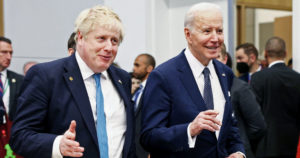In our age of crisis, the state has been reawakened, breaking the taboos of the past few decades. But it’s still an uphill climb. Over the past 40 years, there was broad political agreement that markets were not to be meddled with, and that the power of the state had to be reined in. Economists such as Milton Friedman argued that the overbearing nature of the Keynesian state had suffocated the entrepreneurial spirit, making workers lazy and entitled. Much of this situation, they claimed, was the result of intrusive government interfering with the smooth running of the free market.
Then, in the Eighties, Right-wing politicians such as Margaret Thatcher and Ronald Reagan adopted this philosophy, taking aim at the “nanny state” that had supposedly led to the proliferation of “welfare queens”. They were followed by Third Way politicians like Bill Clinton and Tony Blair, who were convinced that the “era of big government is over” and the state’s power had to be reduced. Besides demolishing much of the welfare state, European state-owned enterprises that accounted for a significant chunk of national economies were also targeted. Companies such as British Gas, British Telecom, British Steel, and the railway sector were all privatised. But the aim of these policies was not merely a drive for efficiency; they were also designed to break the power of trade unions, while trying to turn Britain into a “shareholder society”.
Until a decade ago there was overwhelming support for this reining in of the power of the state, and in particular the privatisation of state-owned enterprises. But after the wave of repeated crises we have suffered since 2008, the public mood has changed considerably. According to YouGov, around 60% of British citizens now want to nationalise a UK rail sector infamous for its extortionate fares, and a similar number want to nationalise the energy sector. But it’s not only a matter of changing attitudes but also of political necessity. The current energy crisis is already forcing governments around Europe to consider bringing some energy companies under public ownership.
The Russian invasion of Ukraine has led to a severe rise in the price of oil and gas, with gas prices already increased by 52% by April 2022, and further hikes likely in the autumn. Now politicians are under heavy pressure to find rapid solutions that the market could not provide. Among the measures are releases of strategic reserves to increase supply by importing liquified natural gas from the US, striking gas deals with alternative suppliers from Algeria to Azerbaijan, and fast-tracking new Liquid Natural Gas (LNG) plants.
Governments were also forced to provide subsidies to families and companies to help with rising energy costs. In Britain, part of this was eventually covered through a windfall tax on corporate profits (totalling £5 billion): a common-sense policy given the profiteering going on in the energy sector. But even this intervention was met with disapproval by economists still convinced that the market should take its course, even if it destroys millions of jobs in the process. In preparation for the winter other measures are currently under discussion, including an EU-wide price cap.
Some governments have also been offering free or low-cost public transport to help address rising energy costs. In Germany, the government has launched a nine-euro-a-month ticket to travel across the entire country on local or regional trains during the summer. The initiative has been immensely successful, with train trips increasing by 50% and may even be continued as a “Klimaticket” to fight against carbon emissions. A similar scheme has been adopted by the Spanish government, with 100% discounts on multi-trip ticket journeys on local and regional services from September to December. These measures are all good palliatives, but the war in Ukraine has unearthed systemic fragilities in our economy and highlighted how free-market extremism has put countries’ economic and geopolitical security at risk, while slowing post-carbon transition.
Desperate to reverse this, some policymakers are now turning to more direct forms of state intervention: nationalisations. In France, Emmanuel Macron has launched a plan to bring back the energy giant EDF (which was part-privatised in 2005) under public control, at a cost of around €8 billion. The immediate motivation is to save from bankruptcy a company already laden with debt, which has only grown since Macron forced it to sell energy below market price to avoid an explosion of social unrest. But the nationalisation is also part of a more long-term plan that aims at securing France’s energy independence while meeting its climate transition targets. This comprises the building of six new nuclear power stations over the coming decades.
France isn’t alone in falling back on the state-ownership of strategic companies. In fact, we may well be at the beginning of a wave of nationalisations around Europe, with policymakers forced to reverse Thatcherite policies, by dint of necessity rather than ideology. The UK government has announced that it will part-nationalise the National Grid to help reach the Net Zero targets. Even the German government has mulled the possible nationalisation of energy firms at risk of going bankrupt, including Nord Stream 2. The reason is straightforward: it’s far easier to radically transform the energy sector by owning companies directly than by regulating them.
The real sticking point, however, remains public investment, given the enormous resources needed for the transition to a post-carbon and more secure energy supply that may help reduce prices. In Europe, the 2010s were a “lost decade”, when austerity policies led to a severe drop in public investment in key sectors including energy. But since the pandemic struck, we’ve seen a partial inversion of this self-defeating bean-counter mentality. The European Union Recovery Fund, which totals €800 billion, for instance, was a partial move away from this austerity orthodoxy, and came after a longstanding confrontation with the so-called Frugal Four (Denmark, the Netherlands, Sweden, and Austria).
But even still, it’s wholly insufficient to the challenge the continent faces. Worse, fiscal hawks such as Germany’s finance minister Christian Lindner are already calling for another bout of austerity, even while central banks are raising interest rates, which risks plunging our economies into deep recessions. In the US, even though Biden’s $1 billion Infrastructure Bill was passed, it still barely makes up for decades of public disinvestment, while more ambitious plans contained in the Build Back Better bill were scuppered because of opposition from centrist Democrats like Joe Manchin. Manchin, who is bankrolled by oil lobbies, insists that public investment would contribute to inflation, despite the fact that much of it is directed towards creating alternative streams of energy supply that may help reduce prices.
So while state interventionism is coming back, its return is far from complete. As economist Daniela Gabor has argued, what we’ve seen so far can be described as a “green derisking state”, in which governments attempt to guarantee financial markets against the liability of highly risky investments in the “green transition”.
What is instead required is a far more ambitious strategy — what Gabor calls a “green developmental state” — with governments heavily investing in energy transition and using state-owned companies as the driver of economic transformation. However, this requires moving beyond resorting to state interventionism as an emergency measure and safety net for market failure. It would mean rethinking our entire economic model, finally accepting that some sectors are best run by state-owned companies, and devising fruitful ways in which state and market can collaborate.
As the past decade has shown, there is no market solution to a problem that was created by prioritising the short-term convenience of the market over the long-term security of nations. If we want to avoid environmental disaster, economic decline and geopolitical blackmail, we need to move beyond the self-defeating fallacies of anti-statism.
Disclaimer
Some of the posts we share are controversial and we do not necessarily agree with them in the whole extend. Sometimes we agree with the content or part of it but we do not agree with the narration or language. Nevertheless we find them somehow interesting, valuable and/or informative or we share them, because we strongly believe in freedom of speech, free press and journalism. We strongly encourage you to have a critical approach to all the content, do your own research and analysis to build your own opinion.
We would be glad to have your feedback.
Source: UnHerd Read the original article here: https://unherd.com/




